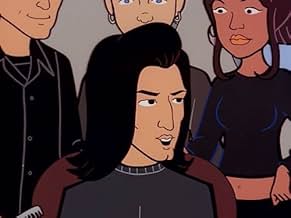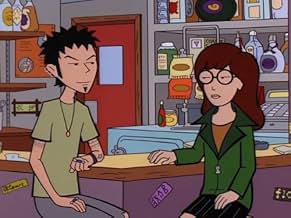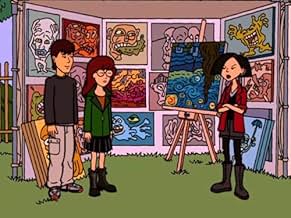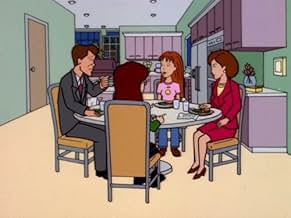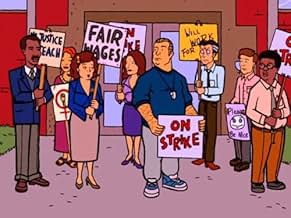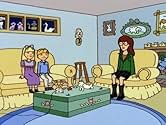Una chica inteligente y cínica atraviesa la vida adolescente como una extraña en un mundo de adolescentes tontos.Una chica inteligente y cínica atraviesa la vida adolescente como una extraña en un mundo de adolescentes tontos.Una chica inteligente y cínica atraviesa la vida adolescente como una extraña en un mundo de adolescentes tontos.
- Premios
- 1 premio ganado y 3 nominaciones en total
Explorar episodios
Opiniones destacadas
Back in the 1990s MTV used to be a driving force in world wide subculture. This show is a timeless container for the spirit of grunge, early internet, high school-horror and teenage angst.
The characters are so well-crafted, it is actually shoking and surprising throughout the whole series. Many cartoons tried character development, more mature narratives and reoccuring themes but in Daria it feels unforced and fits so well. I would not even describe the cartoon with a "serious tone", its simply not a quirky kids show. The relationship between Daria and Jane, which has its ups and downs, is beautifully displayed and closer to real human experience than I have seen in almost anything. Daria is the cynical teenage proto-hipster that might have inspired many after her (when College Humor made a fake real-action-trailer Aubrey Plaza was an unsurprising casting) but has moments that make her more vivid, self-reflecting and plastic than most of the Simpsons.
Even the stereotypes like Quinn show depth at times that catches you by surprise and make you forget you're watching a teenage cartoon.
Entertaining, serious, poetic, rewatchable, funny, cool - Daria has it all.
Entertaining, serious, poetic, rewatchable, funny, cool - Daria has it all.
Most of what should be said about Daria has already been (in previous reviews) so let me just add a few things.
First, contrary to what everyone keeps saying Daria was NOT canceled by MTV. Glenn Eicler, the creator & exec producer, decided to stop at five seasons (actually five 13-episode half seasons & two 90 min episodes). MTV would have ordered a sixth, but he felt the show had run its course. And to MTV's credit they didn't hand the show over to someone else just to try and milk some more money out of it with what would have undoubtedly been inferior episodes.
Not to MTV's credit however, Daria reruns were yanked from the schedule almost immediately after the series finale. I guess its just the nature of the beast. MTV just doesn't 'do' reruns. They're so last season...
What really annoys me though is that they decided to rerun Daria on Noggin', a cable channel which is a joint venture between PBS & Nickelodeon. Nickelodeon is owned by Viacom which also owns MTV. Which means Daria reruns were essentially 'dumped' there (i.e. since they own Noggin' they didn't sell it to them and since Noggin' is non-commercial it isn't generating any revenue for them). A very indignant way to treat a show that was both a critical and ratings success, to essentially treat it as worthless filler material.
And to really add insult to injury Noggin' is absolutely the wrong place for Daria. Yes it features a very smart, semi-realistic, teenage girl lead character, but again contrary to what others have said, Daria is not and never was a show for teenage girls (let alone pre-teens)!! It was always aimed at a 20-something and up audience. And not just female. Its true that most of the main characters were women (and a lot of the male characters had 'interesting' eccentricities) but the show never, EVER pushed any kind of feminist agenda (or any other kind of agenda except for maybe 'damn what others think, just be yourself').
And since Noggin' IS aimed at pre-teen girls Daria episodes have not just been edited, they've been emasculated. They've been stripped of all the adult wit and gritty, biting satire that was the essence of the series. Airing them this way is, IMO, worse than not showing them at all. In fact at least a half dozen episodes are so adult that Noggin' has never shown them. Please, PLEASE Viacom sell the series to Cartoon Network. They'd buy & air it (unedited) in a heartbeat!
If you've never seen Daria I beg you, don't watch it on Noggin'! A few episodes are out on video & DVD (search for 'daria DVD' on eBay).
First, contrary to what everyone keeps saying Daria was NOT canceled by MTV. Glenn Eicler, the creator & exec producer, decided to stop at five seasons (actually five 13-episode half seasons & two 90 min episodes). MTV would have ordered a sixth, but he felt the show had run its course. And to MTV's credit they didn't hand the show over to someone else just to try and milk some more money out of it with what would have undoubtedly been inferior episodes.
Not to MTV's credit however, Daria reruns were yanked from the schedule almost immediately after the series finale. I guess its just the nature of the beast. MTV just doesn't 'do' reruns. They're so last season...
What really annoys me though is that they decided to rerun Daria on Noggin', a cable channel which is a joint venture between PBS & Nickelodeon. Nickelodeon is owned by Viacom which also owns MTV. Which means Daria reruns were essentially 'dumped' there (i.e. since they own Noggin' they didn't sell it to them and since Noggin' is non-commercial it isn't generating any revenue for them). A very indignant way to treat a show that was both a critical and ratings success, to essentially treat it as worthless filler material.
And to really add insult to injury Noggin' is absolutely the wrong place for Daria. Yes it features a very smart, semi-realistic, teenage girl lead character, but again contrary to what others have said, Daria is not and never was a show for teenage girls (let alone pre-teens)!! It was always aimed at a 20-something and up audience. And not just female. Its true that most of the main characters were women (and a lot of the male characters had 'interesting' eccentricities) but the show never, EVER pushed any kind of feminist agenda (or any other kind of agenda except for maybe 'damn what others think, just be yourself').
And since Noggin' IS aimed at pre-teen girls Daria episodes have not just been edited, they've been emasculated. They've been stripped of all the adult wit and gritty, biting satire that was the essence of the series. Airing them this way is, IMO, worse than not showing them at all. In fact at least a half dozen episodes are so adult that Noggin' has never shown them. Please, PLEASE Viacom sell the series to Cartoon Network. They'd buy & air it (unedited) in a heartbeat!
If you've never seen Daria I beg you, don't watch it on Noggin'! A few episodes are out on video & DVD (search for 'daria DVD' on eBay).
I've read the user comments for "Daria" and I noticed one thing. All the bad reviews are written by elitist goth kids who disliked that an "alternative" show like it was aired on a "mainstream" TV channel like MTV. Don't let yourself fooled by these comments.
Sure, this show aired on MTV. Doesn't it seem a bit weird that it bashes everything MTV is all about? Sure, it is trendy to be different and artsy to some extent. Didn't MTV just want to take advantage of this? Personally, I think that Daria is one of the best and funniest shows that I've ever seen.
This show might seem like it's about teen angst. It might seem like Daria is your typical high school outcast with her artistic friend who are proud of being "different" yet aren't that much different after all. But this is not at all what it's like.
First, this show isn't particularly aired at teenagers. It's aired at any young people, I'd say anyone from 12 to 35 but people in their late teens and 20's can enjoy it more since they've gone through high school or are still in high school. Daria criticizes high school life. Aside from the "be yourself and screw what others think" moral, the goal of the show is to make it's watchers laugh. Daria lives in an exagerated version of reality where teenagers and adults are completely brainwashed by society and often act in ridiculous ways. This is what is so funny. Even though the show is so realistic, the fact that it's exagerated reminds us that it doesn't take itself too seriously and that the goal isn't to be preachy but to be humorous.
As I said earlier, Daria is not your typical rebellious teenager. Daria and her friend Jane are spectators in the show and their only roles are to let us see the world through their eyes. However, Jane and Daria are two completely different characters. Jane is a lot less negative than Daria about a lot of things, by example. This only makes the show more interesting because they aren't just two goth teenagers whining about the world around them. Daria is a realistic character while not being a stereotype. Many people view her as a person who's unconfident but I think she's more confident than most characters in the show. She just views things as they are, with a tint of bitterness, without falling into the "gothic" category, yet she still treats her surroundings with respect.
If you disliked the superficial world that is high school, I suggest this show for a lot of laughs.
Sure, this show aired on MTV. Doesn't it seem a bit weird that it bashes everything MTV is all about? Sure, it is trendy to be different and artsy to some extent. Didn't MTV just want to take advantage of this? Personally, I think that Daria is one of the best and funniest shows that I've ever seen.
This show might seem like it's about teen angst. It might seem like Daria is your typical high school outcast with her artistic friend who are proud of being "different" yet aren't that much different after all. But this is not at all what it's like.
First, this show isn't particularly aired at teenagers. It's aired at any young people, I'd say anyone from 12 to 35 but people in their late teens and 20's can enjoy it more since they've gone through high school or are still in high school. Daria criticizes high school life. Aside from the "be yourself and screw what others think" moral, the goal of the show is to make it's watchers laugh. Daria lives in an exagerated version of reality where teenagers and adults are completely brainwashed by society and often act in ridiculous ways. This is what is so funny. Even though the show is so realistic, the fact that it's exagerated reminds us that it doesn't take itself too seriously and that the goal isn't to be preachy but to be humorous.
As I said earlier, Daria is not your typical rebellious teenager. Daria and her friend Jane are spectators in the show and their only roles are to let us see the world through their eyes. However, Jane and Daria are two completely different characters. Jane is a lot less negative than Daria about a lot of things, by example. This only makes the show more interesting because they aren't just two goth teenagers whining about the world around them. Daria is a realistic character while not being a stereotype. Many people view her as a person who's unconfident but I think she's more confident than most characters in the show. She just views things as they are, with a tint of bitterness, without falling into the "gothic" category, yet she still treats her surroundings with respect.
If you disliked the superficial world that is high school, I suggest this show for a lot of laughs.
I'm 34 years old as of this writing, so why do I like this spin-off of Beavis and Butt-head? The sarcasm of Tracy Grandstaff will sting you with laughter, not to mention Miss Morgendorffer's refusal to go along with the "conform-or-die" mentality that's forced upon teenagers, whether it's from her elders, the popular creeps, or the various counter-cultures. Imagine a girl like her in previous decades of teen-dom. Her attitude toward peer pressure is close to the one I had when I was in high school (..and now feel even stronger about), as is her Dad's seething resentment toward the people who robbed him of the "joy of youth."
Long live Daria. If the show doesn't last, may it's legacy do so.
Long live Daria. If the show doesn't last, may it's legacy do so.
The self-defeating world of MTV began as a spark in the mind of one perceptive demographics adviser or another, but soon it grew to epidemic proportions, numbing and sugarcoating all things rebellious in a depressingly successful attempt to convince the masses that nonconformity is all about styles and fads. Any sensible teenager will tell you that it is an unwitting mockery of the things it believes it is making available to an already converted audience, but amongst the throngs of bright colors and loud-but-not-too-loud noises that essentially is MTV, you will occasionally find a gem; an intelligent, insightful, informed show of independent thought, sincerity and sardonic subtlety. "Daria" is one such example.
Anybody who used to watch "Beavis and Butthead" (no comment) will recognize Daria already, as the plain girl with glasses and the monotone voice that would often foil the titular duo's moronic and half-baked plans. When the show began to think about packing it in, MTV approached the creators with the offer of giving Daria her own show. And thank heavens for that. Not only is "Daria" up there with "Frasier" as one of the greatest spin-offs of all time, but it threatens to take a place as one of the greatest stand-alone shows of all time.
Daria Morgendorffer, our bland anti-heroine, is not your average teenage girl. Smart, sarcastic, opinionated but highly unmotivated, her life revolves around observing the actions of others with her best friend Jane Lane, a misfit artist from a family of unconventional thinkers. Together Daria and Jane see fit to mock the sea of stereotypes that is their suburban hometown of Lawndale, mainly the student body of their high school. Daria's deep loathing of all things superficial is regularly tested by the presence of her shallow and materialistic sister Quinn, while her workaholic lawyer mother Helen and her perpetually stressed out and slightly unbalanced father Jake struggle to do the right thing by their daughters in the interactive jumble that is life in Lawndale.
At a mere glance, one might perceive "Daria" as a children's show, due to its animation. However, even the slightest exertion of further examination would reveal that it is no more a children's show than "The Angry Beavers" is a sophisticated portrayal of American Wildlife. Where a lot of shows sell their credibility for cheap laughs and mold their characters on popularity polls, "Daria" is firm in its subtlety, never wavering in its belief that, given time, its audience will get the joke. Some may take longer than others, but all that do never turn back.
The genius of the show lies in its ironic reflection of a culture that would never allow a show like this to get off the ground. Surrounded on all sides by the trivial and materialistic values she lives to hate, Daria takes refuge in the companionship of Jane, the isolated safety of her own room and the glow of the television (which will probably be tuned in to dissocial ironathon news program 'Sick Sad World'), emerging now and again for a futile attempt to significantly impact the alienating world around her. And perhaps the experience might be alienating to us, the audience, if it weren't for the shows strategic and successful ploy to get us to see the world through Daria's eyes. Once there, we're completely hooked, and all the rest of the show's intrinsic jokes fall into place.
Arguably the most enviable quality of animation is its freedom to let characters be exaggerated without being unrealistic. The most brilliant thing about this is that eventually, characters that are truly only meant to serve as tired clichés perversely become beloved, unique personalities. Trent, Jane's lazy soft spoken musician brother with delusions of future stardom with his garage band Mystik Spiral, Kevin and Brittany, quarterback of the football team and head of the cheerleaders respectively, two blissfully ignorant airhead lovers with no aspirations beyond their current high school status, Mr. O'Neal, the hypersensitive English teacher, balanced in the extreme by the borderline psychopathic Mr. DeMartino, an irate History teacher who has lost the will to educate. Even the unbearably shallow and conceited Fashion Club, four fashion-victimized teenage girls who believe their undeservedly elitist circle is doing the world around them a world of good, gradually grow on you until, like it or not, you couldn't imagine Lawndale without them.
It is because of this paradoxical attachment to the characters that serious plot developments towards the end of the series are able to engage the audience on a level that is more than just honesty for the sake of mockery. Once we've grown accustomed to Daria's detached and cynical attitude, the show begins to admit that perhaps it has been having us on a little bit, at least concerning the rigid personalities of our beloved caricature personas. Therefore, once Daria has opened up a smidgeon , so does her/our view of her world, in an event suspiciously symptomatic of personal growth. And from there it's a small step to actually caring about the students, teachers and residents of Lawndale as we farewell them in the "Daria" movie finale "Is It College Yet?", in which we see our little high-schoolers graduate and move on. It says a lot about the show that it is able to gradually soften its bite enough to let us feel for the characters without ever feeling inconsistent.
If one were to only catch a few episodes of "Daria", then they might like what they see, and they'd be well justified. But they'd ultimately be missing out. Because as entertaining as the self-contained half-hour segments of the show can be, the world of Daria is not about separate jokes, separate characters, separate stories or separate anything. Everything within the show works to build to a greater understanding about teenage life, indeed about life in general, and everything it entails; a simple masterpiece that's value only increases when put into social context.
Anybody who used to watch "Beavis and Butthead" (no comment) will recognize Daria already, as the plain girl with glasses and the monotone voice that would often foil the titular duo's moronic and half-baked plans. When the show began to think about packing it in, MTV approached the creators with the offer of giving Daria her own show. And thank heavens for that. Not only is "Daria" up there with "Frasier" as one of the greatest spin-offs of all time, but it threatens to take a place as one of the greatest stand-alone shows of all time.
Daria Morgendorffer, our bland anti-heroine, is not your average teenage girl. Smart, sarcastic, opinionated but highly unmotivated, her life revolves around observing the actions of others with her best friend Jane Lane, a misfit artist from a family of unconventional thinkers. Together Daria and Jane see fit to mock the sea of stereotypes that is their suburban hometown of Lawndale, mainly the student body of their high school. Daria's deep loathing of all things superficial is regularly tested by the presence of her shallow and materialistic sister Quinn, while her workaholic lawyer mother Helen and her perpetually stressed out and slightly unbalanced father Jake struggle to do the right thing by their daughters in the interactive jumble that is life in Lawndale.
At a mere glance, one might perceive "Daria" as a children's show, due to its animation. However, even the slightest exertion of further examination would reveal that it is no more a children's show than "The Angry Beavers" is a sophisticated portrayal of American Wildlife. Where a lot of shows sell their credibility for cheap laughs and mold their characters on popularity polls, "Daria" is firm in its subtlety, never wavering in its belief that, given time, its audience will get the joke. Some may take longer than others, but all that do never turn back.
The genius of the show lies in its ironic reflection of a culture that would never allow a show like this to get off the ground. Surrounded on all sides by the trivial and materialistic values she lives to hate, Daria takes refuge in the companionship of Jane, the isolated safety of her own room and the glow of the television (which will probably be tuned in to dissocial ironathon news program 'Sick Sad World'), emerging now and again for a futile attempt to significantly impact the alienating world around her. And perhaps the experience might be alienating to us, the audience, if it weren't for the shows strategic and successful ploy to get us to see the world through Daria's eyes. Once there, we're completely hooked, and all the rest of the show's intrinsic jokes fall into place.
Arguably the most enviable quality of animation is its freedom to let characters be exaggerated without being unrealistic. The most brilliant thing about this is that eventually, characters that are truly only meant to serve as tired clichés perversely become beloved, unique personalities. Trent, Jane's lazy soft spoken musician brother with delusions of future stardom with his garage band Mystik Spiral, Kevin and Brittany, quarterback of the football team and head of the cheerleaders respectively, two blissfully ignorant airhead lovers with no aspirations beyond their current high school status, Mr. O'Neal, the hypersensitive English teacher, balanced in the extreme by the borderline psychopathic Mr. DeMartino, an irate History teacher who has lost the will to educate. Even the unbearably shallow and conceited Fashion Club, four fashion-victimized teenage girls who believe their undeservedly elitist circle is doing the world around them a world of good, gradually grow on you until, like it or not, you couldn't imagine Lawndale without them.
It is because of this paradoxical attachment to the characters that serious plot developments towards the end of the series are able to engage the audience on a level that is more than just honesty for the sake of mockery. Once we've grown accustomed to Daria's detached and cynical attitude, the show begins to admit that perhaps it has been having us on a little bit, at least concerning the rigid personalities of our beloved caricature personas. Therefore, once Daria has opened up a smidgeon , so does her/our view of her world, in an event suspiciously symptomatic of personal growth. And from there it's a small step to actually caring about the students, teachers and residents of Lawndale as we farewell them in the "Daria" movie finale "Is It College Yet?", in which we see our little high-schoolers graduate and move on. It says a lot about the show that it is able to gradually soften its bite enough to let us feel for the characters without ever feeling inconsistent.
If one were to only catch a few episodes of "Daria", then they might like what they see, and they'd be well justified. But they'd ultimately be missing out. Because as entertaining as the self-contained half-hour segments of the show can be, the world of Daria is not about separate jokes, separate characters, separate stories or separate anything. Everything within the show works to build to a greater understanding about teenage life, indeed about life in general, and everything it entails; a simple masterpiece that's value only increases when put into social context.
¿Sabías que…?
- TriviaJane, Quinn, and Helen are all voiced by the same actress, Wendy Hoopes.
- ErroresThroughout the series there are shots of Miss Li talking to the students in the auditorium and Trent (Jane's brother) is clearly visibly in many of the shots although he's much older and had already graduated high school 5 years earlier.
- Citas
Trent Lane: [his breathy greeting to everyone] H-hey.
- Créditos curiososDuring the closing credits, the show's characters appear in various costumes.
- Versiones alternativas'Daria' episodes released on home video/DVD have their original MTV broadcast version music clips removed and are replaced by more generic stock music.
- ConexionesFeatured in America's Teenagers Growing Up on Television (1998)
Selecciones populares
Inicia sesión para calificar y agrega a la lista de videos para obtener recomendaciones personalizadas
Detalles
Contribuir a esta página
Sugiere una edición o agrega el contenido que falta



